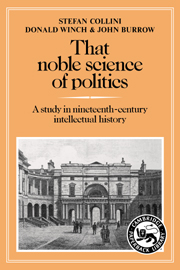Book contents
- Frontmatter
- Contents
- Preface
- PROLOGUE: The governing science: things political and the intellectual historian
- I The system of the North: Dugald Stewart and his pupils
- II Higher maxims: happiness versus wealth in Malthus and Ricardo
- III The cause of good government: Philosophic Whigs versus Philosophic Radicals
- IV The tendencies of things: John Stuart Mill and the philosophic method
- V Sense and circumstances: Bagehot and the nature of political understanding
- VI All that glitters: political science and the lessons of history
- VII The clue to the maze: the appeal of the Comparative Method
- VIII Particular polities: political economy and the historical method
- IX The ordinary experience of civilised life: Sidgwick and the method of reflective analysis
- X A separate science: polity and society in Marshall's economics
- XI A place in the syllabus: political science at Cambridge
- EPILOGUE: A nebulous province: the science of politics in the early twentieth century
- Index
XI - A place in the syllabus: political science at Cambridge
Published online by Cambridge University Press: 17 September 2009
- Frontmatter
- Contents
- Preface
- PROLOGUE: The governing science: things political and the intellectual historian
- I The system of the North: Dugald Stewart and his pupils
- II Higher maxims: happiness versus wealth in Malthus and Ricardo
- III The cause of good government: Philosophic Whigs versus Philosophic Radicals
- IV The tendencies of things: John Stuart Mill and the philosophic method
- V Sense and circumstances: Bagehot and the nature of political understanding
- VI All that glitters: political science and the lessons of history
- VII The clue to the maze: the appeal of the Comparative Method
- VIII Particular polities: political economy and the historical method
- IX The ordinary experience of civilised life: Sidgwick and the method of reflective analysis
- X A separate science: polity and society in Marshall's economics
- XI A place in the syllabus: political science at Cambridge
- EPILOGUE: A nebulous province: the science of politics in the early twentieth century
- Index
Summary
Clearness and precision in our general political conceptions, definiteness and consistency in our fundamental assumptions and methods of reasoning, though they do not constitute anything like a complete protection against erroneous practical conclusions, are yet, I believe, of considerable practical value; and the systematic effort to acquire them deserves an important place in the intellectual training of a thoroughly educated man and citizen.
henry sidgwick, The Elements of Politics (1891)Attempt a description of the merits, and suggest lines on which criticisms might proceed, of the methods of any one of the following contributions to political science: John Austin, Henry Sumner Maine, Walter Bagehot, Henry Sidgwick.
Examination question in ‘Political Science’, Indian Civil Service Entrance Competition, 1901almost any experience of the realities of education is sufficient to produce a pang of recognition at the awful distance which must in practice have separated our two epigraphs despite their chronological, and even apparently substantial, proximity. Sidgwick's sentiment would have been shared, due allowance being made for peculiarities of expression, by most of the proponents of a science of politics considered in these essays: in some of the more confident early nineteenth-century statements the defensive note of the reference to ‘protection against erroneous practical conclusions’ might have been more muted, and the mention of the ‘citizen’ and his ‘intellectual training’ perhaps bespeaks the related later nineteenth-century developments of both democracy and education; but otherwise the passage is no bad representative of the class of programmatic declarations.
- Type
- Chapter
- Information
- That Noble Science of PoliticsA Study in Nineteenth-Century Intellectual History, pp. 339 - 364Publisher: Cambridge University PressPrint publication year: 1983



